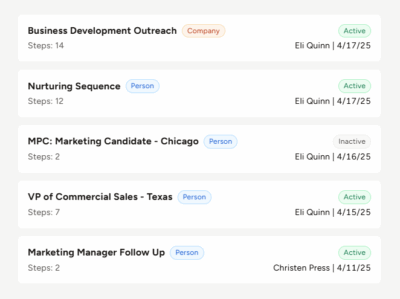For some people, working a monotonous job just isn’t in their DNA. They thrive in people-centric situations, need variation, and adapt to changing conditions. If you’re interested in a fast-paced and dynamic career, working as a recruiter might be for you.
Recruiters find candidates to fill open job positions at their clients’ businesses and organizations.They match candidates to their clients based on the person’s experience, education, and qualifications.
Not sure if the recruiting industry is for you? This guide includes three must-have lists for anyone considering becoming a recruiter:
- Reasons to become a recruiter
- Personality traits of recruiters
- Responsibilities of recruiters
Being a recruiter isn’t easy. But, to the right person, it is a fulfilling and worthwhile career.
Reasons to become a recruiter
Working as a recruiter offers a unique set of challenges and rewards. Here are five reasons to become a recruiter.
#1. You get to improve lives
When it comes to recruiting, everyone wins when you place a candidate. Sure, you get paid. But when you’re successful at your job, you also improve the lives of those you work with.
Candidates need to earn an income to provide for themselves and their families. You help job seekers find work that fits their skills and interests.
And, employers need workers. You match them with qualified employees so they can focus on their businesses. As a recruiter, you have a huge impact on everyone you come in contact with, which can be very rewarding.
#2. Recruiting is measurable
When you try something new, do you question whether you are doing well? With recruiting, there is an endless supply of data and recruiting metrics you can use to measure performance. You won’t constantly wonder, “Am I doing this right?”
Measurable data creates transparency. By knowing where your recruiting sourcing strategies stand, you can leverage your best techniques and pinpoint weak areas. But, there is a catch: you can’t hide behind the smoke and mirrors of false achievement.
Your data must reflect success to be an excellent recruiter. If you like to see an honest reflection of your progress, consider recruiting.
#3. You experience variety
If you enjoy facing different challenges every day, recruiting as a career might be for you. In the recruiting industry, no two days are the same. And, there’s always something to do.
For example, you might talk with candidates one day and tackling the issue of how to find clients for your recruiting business the next. You encounter a range of fields and businesses. The people you work with will vary each day. Those who are troubleshooters and life-long learners often excel at recruiting.
#4. There’s job security
Though the job market changes, recruiting is not going away anytime soon. The Bureau of Labor Statistics reported that HR specialists and recruiter jobs will continue to grow at a rate of 5% (as fast as average) through 2024. If you work hard and provide excellent service, clients will continue to bring you job orders.
How much do recruiters make? The average annual salary of a recruiter is $58,350, according to the Department of Labor. Your earning potential could be more since your salary is related to performance. The more jobs you fill, the higher your salary. If you decide to be a recruiter, you are in control of how much you earn.
#5. You get to network
Recruiting is not a job where you can hide behind your computer. You have to get out into the world, shake hands, and engage with people at recruitment networking events. It’s about building relationships and earning the trust of both clients and candidates. If you’re a people person, networking could be a big reason to pursue recruiting.
In this industry, the grapevine is your ally. And lasting relationships are gold. They will lead you to more candidates and clients throughout your career as a recruiter. If you’re a people person, face-to-face networking could be a big reason to pursue recruiting.
Personality traits of recruiters
From the reasons listed above, you might consider becoming a recruiter. But, it takes a certain kind of person to be a recruiter. Do you have the following six personality traits of recruiters?
#1. Good at communicating
It’s no secret that recruiters are constantly communicating with people. You need to be able to convey your message clearly, no matter who you’re talking to. Candidates must understand the job you’re offering. And, employers need to know exactly what kind of worker you’re matching them with.
When you talk to many different people, you need to be able to shift gears quickly. You must have communication skills across a variety of platforms, such as in-person, over the phone, and in writing. Make sure you’re comfortable speaking to large groups and one-on-one.
#2. Attentive listener
To satisfy candidates and clients, recruiters must be attentive listeners. By paying attention to what your clients say, you can piece together the big picture of what they want. The same is true for candidates — you need to listen to find out what kind of jobs they’re interested in.
Recruiters should use eye contact and be ready to answer questions during conversations. Good recruiters take notes and remember key details from their interactions. You can tell if a recruiter is attentive by comparing their results to the clients’ and candidates’ expectations.
#3. Organized
As a recruiter, you are always on the move. You need to juggle many tasks throughout the day as you screen recruits and manage job orders. The more organized you are, the more efficiently you will place candidates. Time management for recruiters is a must-have.
If you are all over the place and have trouble staying organized, recruiting might not be your top career choice. That’s not to say recruiters need a spotless desk to succeed. This industry is fast-paced and often calls for unplanned, on-the-fly actions. These situations will go much more smoothly if you have an organized system.
Use this recruiter daily planning template if you’re not sure how to get started.
#4. Competitive nature
In the world of recruiting, there are clear-cut winners. Recruiters don’t like to lose. Starting a recruiting business and successfully maintaining it requires a competitive nature. That drive will help you achieve top-notch placements for your candidates.
Being competitive means that you go the distance to secure the best talent. You prepare for interviews and research your clients’ needs. You have the persistence to follow up with candidates, and you don’t give up the first time you’re told “no.” Your competitiveness also pushes you to improve throughout your career as a recruiter.
#5. Confident
As a recruiter, many people rely on you. If you don’t have the confidence to ensure results and fix issues, your recruiting business will quickly sink.
You deal with business owners, upper-level managers, and candidates that know their worth. If you don’t have confidence as a recruiter, the people you deal with won’t have confidence in you.
#6. Quick learner
As a recruiter, you need to learn quickly and think even quicker. Key players in recruiting are problem solvers. Rather than staring at a problem, you spend your time finding a solution. Sometimes, you have to get creative to resolve issues, so troubleshooting is a must.
Recruiters place candidates in jobs that range across the industry board. Each position requires a unique set of knowledge and skills. You need to understand these specific details to place the best candidates. Successful recruiters know that each conversation is an opportunity to learn.
Responsibilities of recruiters
Tasks that recruiters complete vary widely. Every day is different, and every day brings new and unexpected challenges. That said, here are six common responsibilities of recruiters.
#1. Understand employer laws
Make sure both your candidates and clients are happy with the placements you make. A big part of achieving this is preparing clients for employer laws. If workforce rules are broken, you will likely end up with an unhappy candidate and a client in trouble with the government.
Educate yourself about employer responsibilities and fair hiring practices. Stay up-to-date with changing laws. Provide your clients with information to help them be compliant employers. You can even offer free resources, such as blog articles or an employer handbook.
#2. Establish client needs
Before you search for candidates, you must have a full understanding of what each client needs. Above all else, recruiters must provide value. That value is going to come from finding out the recruiting guidelines your client wants you to follow.
Once the client expresses their needs, do some research. The more information you collect about the open position, the better you can fill it. Once you know what will satisfy the client, be sure the details are listed in the job description.
#3. Connect with candidates
Recruiting is all about making connections. You can engage candidates with job posting boards, emails, social media, and events. Save contact numbers and resumes in your recruiting database for future job orders. Just because a candidate didn’t work out for one job doesn’t mean they won’t be a perfect match for another.
Once you find matches, it’s time to make phone calls. Speak to the selected candidates about their abilities and expectations. Then, relay the information to your clients. You are the sole line of communication between candidates and clients.
#4. Use technology
You cannot be shy about utilizing technology for recruiting purposes. Many tech applications streamline the selection process and help you make placements faster.
For example, you can use an applicant tracking software (ATS) to sort and track candidates. ATS imports resumes to the software in a uniform format. With this type of recruiting software, you can easily compare candidates and sort resumes by certain details, such as skill level.
Don’t forget simple tech solutions that make recruiting easier. Digital templates give your recruiting documents a consistent look and make corresponding fast. Just fill in the blanks according to the candidate or client you are sending the document to.
#5. Offer guidance
One of the responsibilities of recruiters is to help clients and candidates through the recruitment process. Both will have a lot of questions from start to finish. You need to provide fast and clear answers so clients and candidates know what to expect.
Offering guidance helps integrate candidates and clients into their new roles as workers and employers. You can prepare candidates by coaching them on interviewing and writing resumes. And, you can give clients guidance in conducting an interview and offering compensation packages.
#6. Make placements
Of course, the most rewarding responsibility for a recruiter is making placements. Before you can close the job, you need to make an offer to the candidate. If the candidate does not accept the offer, you have more work to do.
Call the candidate to let them know your client would like to hire them for the job. If they accept, walk them through the next steps in the employee placement process. Inform your client that the candidate has accepted the offer, and go over their next steps.








